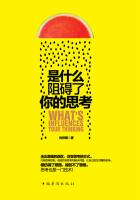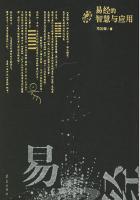It is evident also how one should solve those refutations that depend upon the division and combination of words:for if the expression means something different when divided and when combined,as soon as one”s opponent draws his conclusion one should take the expression in the contrary way.All such expressions as the following depend upon the combination or division of the words:”Was X being beaten with that with which you saw him being beaten?” and ”Did you see him being beaten with that with which he was being beaten?” This fallacy has also in it an element of amphiboly in the questions,but it really depends upon combination.For the meaning that depends upon the division of the words is not really a double meaning (for the expression when divided is not the same),unless also the word that is pronounced,according to its breathing,as eros and eros is a case of double meaning.(In writing,indeed,a word is the same whenever it is written of the same letters and in the same manner— and even there people nowadays put marks at the side to show the pronunciation— but the spoken words are not the same.)Accordingly an expression that depends upon division is not an ambiguous one.It is evident also that not all refutations depend upon ambiguity as some people say they do.
The answerer,then,must divide the expression:for ”I—saw—a—man—being—beaten with my eyes” is not the same as to say ”I saw a man being—beaten—with—my—eyes”.Also there is the argument of Euthydemus proving ”Then you know now in Sicily that there are triremes in Piraeus”:and again,”Can a good man who is a cobbler be bad?”No.”But a good man may be a bad cobbler:therefore a good cobbler will be bad.” Again,”Things the knowledge of which is good,are good things to learn,aren”t they?”Yes.”The knowledge,however,of evil is good:therefore evil is a good thing to know.”
”Yes.But,you see,evil is both evil and a thing—to—learn,so that evil is an evil—thing—to—learn,although the knowledge of evils is good.” Again,”Is it true to say in the present moment that you are born?”Yes.”Then you are born in the present moment.”No; the expression as divided has a different meaning:for it is true to say—in—the—present—moment that "you are born",but not "You are born—in—the—present—moment".” Again,”Could you do what you can,and as you can?”Yes.”But when not harping,you have the power to harp:
and therefore you could harp when not harping.”No:he has not the power to harp—while—not—harping; merely,when he is not doing it,he has the power to do it.” Some people solve this last refutation in another way as well.For,they say,if he has granted that he can do anything in the way he can,still it does not follow that he can harp when not harping:for it has not been granted that he will do anything in every way in which he can; and it is not the same thing”
to do a thing in the way he can” and ”to do it in every way in which he can”.But evidently they do not solve it properly:for of arguments that depend upon the same point the solution is the same,whereas this will not fit all cases of the kind nor yet all ways of putting the questions:it is valid against the questioner,but not against his argument.
Accentuation gives rise to no fallacious arguments,either as written or as spoken,except perhaps some few that might be made up;e.g.the following argument.”Is ou katalueis a house?”Yes.”Is then ou katalueis the negation of katalueis?”Yes.”But you said that ou katalueis is a house:therefore the house is a negation.” How one should solve this,is clear:for the word does not mean the same when spoken with an acuter and when spoken with a graver accent.
It is clear also how one must meet those fallacies that depend on the identical expressions of things that are not identical,seeing that we are in possession of the kinds of predications.For the one man,say,has granted,when asked,that a term denoting a substance does not belong as an attribute,while the other has shown that some attribute belongs which is in the Category of Relation or of Quantity,but is usually thought to denote a substance because of its expression; e.g.in the following argument:”Is it possible to be doing and to have done the same thing at the same time?”No.”But,you see,it is surely possible to be seeing and to have seen the same thing at the same time,and in the same aspect.” Again,”Is any mode of passivity a mode of activity?”No.”Then "he is cut","he is burnt","he is struck by some sensible object" are alike in expression and all denote some form of passivity,while again "to say","to run","to see" are like one like one another in expression:but,you see,"to see" is surely a form of being struck by a sensible object;therefore it is at the same time a form of passivity and of activity.”
Suppose,however,that in that case any one,after granting that it is not possible to do and to have done the same thing in the same time,were to say that it is possible to see and to have seen it,still he has not yet been refuted,suppose him to say that ”to see” is not a form of ”doing” (activity) but of ”passivity”:for this question is required as well,though he is supposed by the listener to have already granted it,when he granted that ”to cut” is a form of present,and ”to have cut” a form of past,activity,and so on with the other things that have a like expression.For the listener adds the rest by himself,thinking the meaning to be alike:whereas really the meaning is not alike,though it appears to be so because of the expression.The same thing happens here as happens in cases of ambiguity:for in dealing with ambiguous expressions the tyro in argument supposes the sophist to have negated the fact which he (the tyro) affirmed,and not merely the name:whereas there still wants the question whether in using the ambiguous term he had a single meaning in view:for if he grants that that was so,the refutation will be effected.
Like the above are also the following arguments.It is asked if a man has lost what he once had and afterwards has not:for a man will no longer have ten dice even though he has only lost one die.No:















